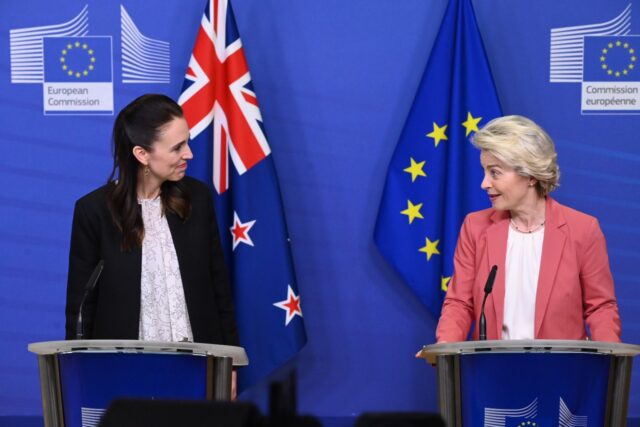The European Union and New Zealand concluded negotiations for a Free Trade Agreement on the 30th of June 2022. This trade agreement is expected to open important economic opportunities for companies and consumers on both sides. This deal also includes unparalleled commitments to sustainability, including mutual respect for the Paris Climate Agreement and core labour rights.
The bilateral trade between European Union and New Zealand is set to increase by up to 30% thanks to this deal, with EU annual exports potentially rising by up to €4.5 billion. EU investment in New Zealand has the potential to rise by up to 80% as reported by the Union.
Ursula von der Leyen, European Commission President, said: “New Zealand is a key partner for us in the Indo-Pacific region. This trade agreement brings major opportunities for our companies, our farmers and our consumers, on both sides. It can help increase trade between us by 30%. It includes unprecedented social and climate commitments. This new agreement between the European Union and New Zealand comes at an important geopolitical moment. Democracies – like ours – work together and deliver for people.”
Executive Vice-President and Commissioner for Trade, Valdis Dombrovskis remarked that his trade deal is “a new generation of trade deal”, where both sides are set to make real economic and environmental gains. He also highlighted the importance of this trade agreement as it will help in facing the challenges posed by the twin shocks of Covid-19 on the global economy.
The agreement has also paved way for new export opportunities for businesses big as well as small. The agreement includes tasks such as:
- Removing all tariffs on EU exports to New Zealand.
- Opening the New Zealand services market in key sectors such as telecommunications, maritime transport, financial service and delivery services.
- Making sure that non-discriminatory treatment is meted out to EU investors in New Zealand and vice versa.
- Enhancing access for EU companies to the New Zealand government, procuring contracts for goods, services, works and works concessions.
- Smoothening the data flow and securing cyberspace.
- Encouraging small and medium enterprises to export more.
- Enforcing intellectual property rights, a significant commitment by New Zealand, aligned with EU standards.
Immediately upon the application of the agreement, EU farmers will have much better opportunities to sell their produce in New Zealand. Tariffs will be eliminated in key exports such as pork, wine and sparkling wine, chocolate, sugar confectionary and biscuits.
The EU-NZ Trade Agreement is the first one to include the EU’s new approach to trade and sustainable development: “The power of trade partnerships: together for green and just economic growth”, which was adopted last week.
The European Union started negotiations for a Free Trade Agreement with New Zealand in June 2018. The 12th round of negotiations was held in March 2022, followed by inter-session dialogues which led to the conclusion of the negotiations on 30 June 2022.









